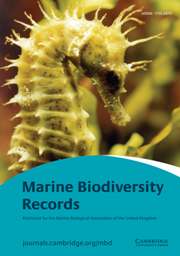No CrossRef data available.
Article contents
First record of Linopherus cf. canariensis (Polychaeta: Amphinomidae) from Rio de Janeiro, Brazil
Published online by Cambridge University Press: 20 October 2015
Abstract
The amphinomid polychaete Linopherus cf. canariensis was recorded for the first time in the coast of Rio de Janeiro (South-east Brazil). In 2011, a total of 15 specimens were collected in the intertidal zone of Itaipu Beach (Niterói) in dead Encope emarginata test fragments. In this study, the specimens are described, and a brief discussion about their morphological variation and invading potential is provided.
- Type
- Research Article
- Information
- Copyright
- Copyright © Marine Biological Association of the United Kingdom 2015
References
REFERENCES
Ahrens, J.B., Borda, E., Barroso, R., Paiva, P.C., Campbell, A.M., Wolf, A., Nugues, M.M., Rouse, G.W. and Schulze, A. (2013) The curious case of Hermodice carunculata (Annelida: Amphinomidae): evidence for genetic homogeneity throughout the Atlantic Ocean and adjacent basins. Molecular Ecology 22, 80–91.Google Scholar
Alós, C. and Núñez, J. (2012) Familia amphinomidae. In Parapar, J., Alós, C., Núñez, J., Moreira, J., López, E., Aguirrezabalaga, F., Besteiro, C. and Martínez, A. (eds) Fauna Iberica Volume 36: Annelida. Polychaeta III. Madrid: Museo Nacional de Ciencias Naturales, pp. 43–75.Google Scholar
Amaral, A.C.Z., Nallin, S.A.H., Steiner, T.M., Forroni, T.O. and Gomes, D.F. (2013) Catálogo das espécies de Annelida Polychaeta do Brasil. Available at: http://www.ib.unicamp.br/museu_zoologia/files/lab_museu_zoologia/Catalogo_Polychaeta_Amaral_et_al_2013_1a.pdf (accessed 4 September 2014).Google Scholar
Amaral, A.C.Z. and Nonato, E.F. (1994) Anelídeos Poliquetos da costa Brasileira. 5. Pisionidae, Chrysopetalidae, Amphinomidae e Euphrosinidae. Revista Brasileira de Zoologia 11, 361–390.Google Scholar
Arias, A., Barroso, R., Anadón, N. and Paiva, P.C. (2013) On the occurrence of the fireworm Eurythoe complanata complex (Annelida, Amphinomidae) in the Mediterranean Sea with an updated revision of the alien Mediterranean amphinomids. ZooKeys 337, 19–33.Google Scholar
Barroso, R. and Paiva, P.C. (2007) Amphinomidae (Annelida: Polychaeta) from Rocas Atoll, Northeastern of Brazil. Arquivos do Museu Nacional 65, 357–362.Google Scholar
Çinar, M.E. (2009) Alien polychaete species (Annelida: Polychaeta) on the southern coast of Turkey (Levantine Sea, eastern Mediterranean), with 13 new records for the Mediterranean Sea. Journal of Natural History 43, 2283–2328.Google Scholar
Cosentino, A. and Giacobbe, S. (2011) The new potential invader Linopherus canariensis (Polychaeta: Amphinomidae) in a Mediterranean coastal lake: Colonization dynamics and morphological remarks. Marine Pollution Bulletin 62, 236–245.Google Scholar
Fauchald, K. (1977) Polychaetes from inter tidal areas in Panama, with a review of previous shallow-water records. Smithsonian Contributions to Zoology 221, 1–92.CrossRefGoogle Scholar
Fauvel, P. (1932) Annelida polychaeta of the Indian Museum, Calcutta. Memoirs of the Indian Museum 12, 1–262.Google Scholar
Hutchings, P.A. (2000) Family Amphinomidae. In Beesley, P.L., Ross, G.J.B. and Glasby, C.J. (eds) Polychaetes and allies: the Southern synthesis. Fauna of Australia. Volume 4A Polychaeta, Myzostomida, Pogonophora, Echiura, Sipuncula. Melbourne: CSIRO Publishing, pp. 107–110.Google Scholar
Kudenov, J.D. (1993) Amphinomidae and Euphrosinidae (Annelida: Polychaeta) principally from Antarctica, the Southern Ocean, and Subantarctic regions. Antarctic Research Series 58, 93–150.Google Scholar
Kudenov, J.D. (1995) Family Amphinomidae Lamarck, 1818. In Blake, J.A., Hilbig, B. and Schott, P.H. (eds) Taxonomic atlas of the benthic fauna of the Santa Maria Basin and Western Santa Barbara channel. California: Santa Barbara Museum, pp. 207–213.Google Scholar
Langerhans, P. (1881) Ueber einige canarische Anneliden. Nova Acta der Kaiserlichen Leopold-Carolin Deutschen Akademie der Naturforscher 42, 93–124.Google Scholar
Leske, N.G. (1778) Additamenta ad Jacobi Theodori Klein Naturalem Dispositionem Echinodermatum et Lucubratiunculam de Aculeis Echinorum Marinorum. Leipzig, Germany: Officina Gleditschiana.Google Scholar
Liñero-Arana, I. and Díaz, O. (2010) Amphinomidae y Euphrosinidae (Annelida: Polychaeta) de la costa nororiental de Venezuela. Latin American Journal of Aquatic Research 38, 107–120.CrossRefGoogle Scholar
Monro, C.C.A. (1933) The polychaeta errantia collected by Dr. C. Crossland at colon in the panama region and the Galapagos Islands during the expedition of the S.Y. ST. GEORGE. Proceedings of the Zoological Society of London 103, 1–96.CrossRefGoogle Scholar
Núñez, J., Brito, M.C. and Ocaña, O. (1991) Anélidos poliquetos de Canarias: familia Amphinomidae. Cahiers de Biologie Marine 32, 469–476.Google Scholar
Paiva, P.C., Young, P.S. and Echeverría, C.A. (2007) The Rocas Atoll, Brazil: a preliminary survey of the Crustacea and Polychaete Fauna. Arquivos do Museu Nacional 65, 241–250.Google Scholar
Pallas, P.S. (1766) Miscellanea Zoologica. The Hague, Netherlands: Hagae Comitum, pp. 72–112.Google Scholar
Peters, W.C.H. (1854) Naturwissenschafliche Reise Nach Mosambique in 1842 his 1848 ansgefdhrt. Monatsberichte der Königlichen Preussische Akademie des Wissenschaften zu Berlin, Berlin, Germany, pp. 610–614.Google Scholar
Quatrefages, A. (1865) Note sur la classification des annélides. Comptes Rendus de L'Académie des Sciences 5, 253–296.Google Scholar
Rohr, T.E. and Almeida, T.C.M. (2006). Anelídeos Poliquetas da Plataforma Continental Externa ao Largo do Estado de Santa Catarina-Brasil: Situação de Verão e Inverno. Brazilian Journal of Aquatic Science and Technology 10, 41–50.Google Scholar
Rouse, G.W. and Pleijel, F. (2001) Polychaetes, 1st edn.New York: Oxford University Press.Google Scholar
Salazar-Vallejo, S.I. (1997) Anfinómidos y euphrosínidos (Polychaeta) del Caribe Mexicano con claves para las especies reconocidas del Gran Caribe. Revista de Biología Tropical 45, 379–390.Google Scholar
San Martín, G. (1986) Anélidos Poliquetas procedentes de la I Expedición Cubano-Española a la Isla de la Juventud y Archipiélago de los Canarreos. II Familias Chrysopetallidae y Amphinomidae. Revista de Investigaciones Marinas 7, 17–30.Google Scholar
Yáñez-Rivera, B. (2009) Amphinomidae. In León-González, J.A., Bastida-Zavala, J.R., Carrera-Parra, L.F., García-Garza, M.E., Peña-Rivera, A., Salazar-Vallejo, S.I. and Solís-Weiss, V. (eds) Poliquetos (Annelida: Polychaeta) de México y América Tropical, 1st edn.Monterrey: Universidad Autónoma de Nuevo León, pp. 77–87.Google Scholar
WoRMS (2015) Linopherus Quatrefages, 1865. World Register of Marine Species. Available at: http://www.marinespecies.org/aphia.php?p=taxdetails&id=129189 (accessed 22 April 2015).Google Scholar


